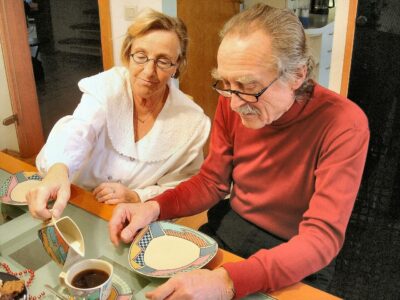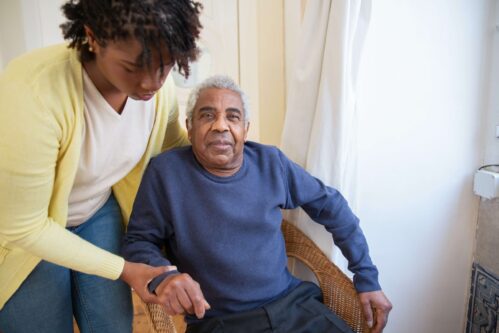When is it time to get Alzheimer’s help at home?
If you are living with someone with Alzheimer’s Disease, at some point in time you will need help. You should start this early in the dementia so that it becomes part of their normal routine.
As soon as you realize they are not safe to be home alone anymore is a good time time to begin companion care at least once a week.
This will help them get used to someone coming in and it will help prevent caregiver burnout. You really need to leave the house at least once a week!
You should assess the changes from Alzheimer’s Disease quarterly. This will help you identify the different areas of decline much easier. You can find the tools you need to track the Alzheimer’s changes here in the Caregivers Notebook.
It is easy for time to get away from you! You may end up not getting out of the house for weeks or months at a time. This is why it is so important to start this early and make it routine. Your mental health depends on you getting away for some self care at least weekly.

What are the different types of Alzheimer’s help at home?
Companion Help:
Someone who can sit and visit with them while you are out. Their role is simply to keep them occupied and safe while you are out of the home. Someone to read to them or talk about the old days.
Family members should be recruited early on. Keep them involved! Try to have someone come the same day and time each week if possible. This will allow you go to the store, run errands, or do something fun. It helps prevent burnout when you know you have a getaway time each week.
Church members often are willing to help. Reach out to your church, especially if you have a Parrish nurse. There are often women in the church who have lots of time on their hands and would love to help. They want to feel needed and helpful; you will be helping them fill a need also!

Personal Care Services:
These caregiver assistants can help provide bathing, dressing, toileting, eating, exercising, or personal care. These are what we refer to in the nursing world as activities of daily living (ADLs). These are usually certified nurse assistants (CNAs) or healthcare technicians (HCTs). Their titles may vary a little in different states. They have had training on providing personal care.
It often becomes to difficult to assist your loved one with Alzheimer’s during bathing. This is often when caregivers reach out for outside help to come in to the home

Homemakers:
These are people who can help with the cooking, cleaning, laundry, or shopping. They usually do not have any special training and they often do not provide personal care such as bathing.
They can help with many household chores. They can also run errands and assist with transportation to appointments. Meal planning, getting groceries, and cooking is one of the services many caregivers appreciate help with.

Skilled Care:
Skilled care is a medical care. This may be a nurse coming to change a dressing, give injections, or assess and help plan the care. Physical therapists are also considered skilled care. It is care provided by a medical professional.

Where do I find these helpers?
Reach out to your doctor, his office staff should be able to point you in the right direction. Call your health department, in my county they are the starting point. They have a list of all the resources available in the area.
https://www.communityresourcefinder.org/ is also a good place to start.
I highly recommend using an agency or someone referred to you personally. When you are calling about Alzheimer’s help in the home, there are several questions you should ask.
- What type of background screening do they do?
- Do they have dementia training?
- Who is responsible for paying the helper, you or the agency?
- What hours their helpers are available?
- Who do you call if they don’t show up?
- Are their services covered by Medicare or Medicaid?
- Can you get the same worker to care for your loved one each week?
- Can you meet the helper before you sign on?

What if I can’t afford Alzheimer’s help at home?
Help in the home can be expensive. Especially in the late stage of Alzheimer’s Disease when you may need help around the clock.
There are different programs that are provided which are funded by Medicare, Medicaid, VA, or other state and federal programs. Find out what is available in your area. These programs usually will cover 4-20 hours a week of homemaker or personal care help.
Medicaid has consumer directed care programs which often allows care recipients to hire relatives as paid caregivers. Commonly, adult children can be hired and paid to provide care for their aging parents. Several states even allow one’s spouse to be hired.
Since it varies greatly from state to state, you will need to start with your local office on aging . More information can be found at these sites:

Learn what help is available and reach out for help.
You will both benefit from weekly help in the home, whether it is family member sitting while you go for a walk in the park or someone to come in and give a bath a couple of times a week.
Your journey is a very difficult one but you don’t have to do this alone!
You can choose to walk down a dark lonely path all alone or one that has assistants along the way to help you.
Don’t Make It Harder Than It Has To Be!
Hi, I'm Larea, I am a Registered Nurse specializing in Dementia Care, with 30 years of experience supporting dementia patients and their families. Over the years, I have provided care in diverse settings, including homes, hospitals, nursing homes, assisted living facilities, and hospice. My passion is guiding caregivers, sharing my knowledge and experience to help them navigate the challenges of dementia care with confidence and compassion.









0 Comments